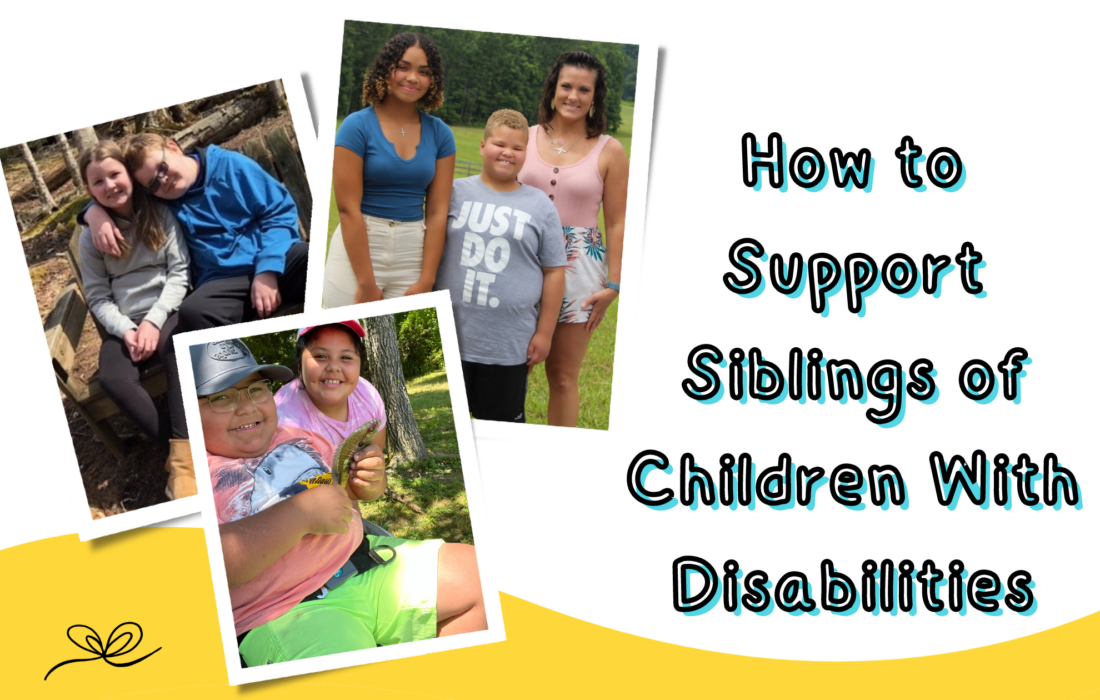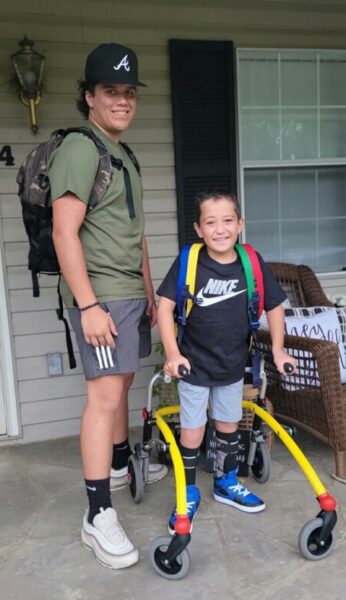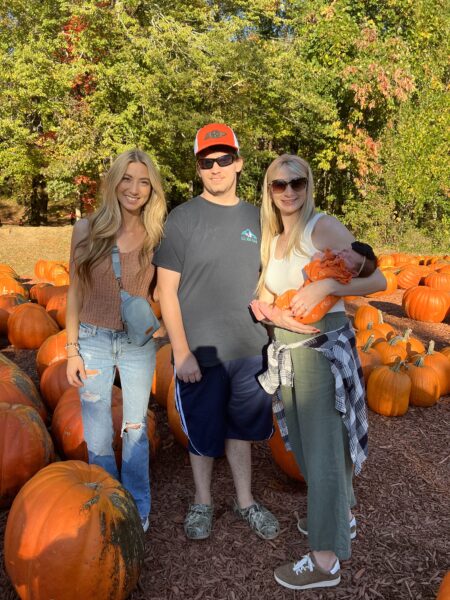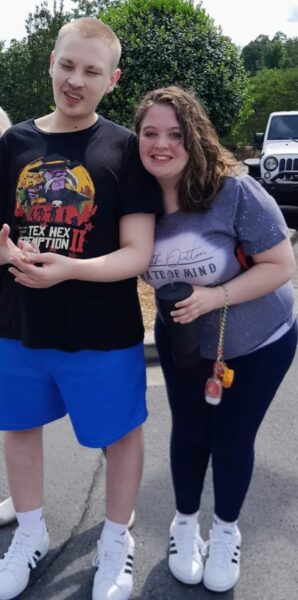
How to Support Siblings of Children With Disabilities
At Specially Gifted Foundation, we understand the unique challenges faced by families caring for children with disabilities. One crucial aspect often overlooked when discussing the difficulties in these families’ journeys is the support and understanding required for the siblings of these children. In an effort to provide a resource to families navigating this experience and those that will in the future, we reached out to several families for guidance on how to support siblings of children with disabilities.
Acknowledging Different Perspectives
As I reached out to families willing to participate in this research, I knew I needed to connect with siblings of different perspectives. I was the oldest child in a home with two younger siblings that have disabilities, and even though my sister is also affected by fragile X syndrome her experience as the youngest sibling was much different than mine. With my brother being fully affected and requiring more of our parents’ time, she grew up with nothing to compare it to.
During the interview process, I had the pleasure of speaking with Carter Nash, Cidney Powers, and Cassidy Maddix.
Understanding the Experience of Older Siblings
If you’ve followed SGF for any time, chances are you know or at least recognize SGF kiddo Parker. During my search for a fellow former only child willing to participate, I was pleased when Parker’s older brother, Carter, said yes.
When asked how having a sibling with a disability impacted his life and family dynamics, Carter said it takes more time and patience. Parker requires more attention, so sometimes it takes attention away from him. He added that although a lot of times it feels like he doesn’t get much attention, at the same time it gives him a pretty good testimony.
Parker and Carter’s mom, Casey, told me that seeing Carter go from being an only child to not only having a sibling, but a sibling with a disability, has been a blessing to witness.
“We know that God created Carter first so he could be there for Parker. He is perfect for the job, and he has grown so much because of their relationship and what this experience has taught him.”
Casey Nash
Growing up, Carter said he has witnessed a lot of miracles happen and he feels like his mom and dad both do a pretty good job trying to balance the amount of attention they give. His advice to other parents is to make sure your other children understand their siblings’ disabilities, and this will help them to be patient along the way.
Carter is very active in Parker’s life and enjoys getting involved with foundations like SGF and Hot Shots. He offered this advice to siblings, “Get involved in your sibling’s life in any way you can – just because it might look different, you don’t know how much fun it is and how rewarding it can be until you try.”
What About the Middle Child?
We’ve all heard of middle child syndrome, but what about being the middle child of a sibling with disabilities? Cidney Powers knows firsthand what this experience is like. She is 11 years older than her brother and was 13 when he was diagnosed with autism around age 2.
In her submission, she explained that the effects of having a sibling with disabilities changed for her as she grew older. When she was younger, she didn’t fully comprehend the differences in her brother and others his age developmentally. Once she got older, she started to notice and began to worry about him fitting in with his peers who were typically developed.
“I had mixed emotions as his sibling between the extra attention he received and the extra attention I knew he needed. I sometimes found myself jealous, especially when I was younger. As an adult, I have acquired more insight on his disability and have a lot more empathy.”
Cidney Powers
Cidney is also the younger sister of SGF team member, Lindsey. You can also read Lindsey’s perspective as a sibling of a child with autism here!
Supporting Younger Siblings From the Start
My sister Cassidy is a year younger than our brother Dylan who is now 26. She was around a year old when Dylan was diagnosed with fragile X syndrome. Once he turned 4, he started having seizures and we learned he also had epilepsy. Since she was so young when he was diagnosed, she has no recollection of what life was like not having a sibling with disabilities.
“When we were younger, at times I would feel neglected or overlooked due to the attention given to my brother. As I got older, it has not been as much of an issue because I started to understand a lot more about his disability and his needs.”
Cassidy Maddix
Caring for Dylan has always come naturally to her because that’s all she’s ever known. She feels like her experience has helped her to be more compassionate and patient. One of the challenges she mentioned was not being able to talk to him like she talks to me, her older sister. This is something that she wished she could do, but she also appreciates the special bond they have and how she “can speak Dylan’s language, too.”
Her advice to other siblings is to be patient, love them, and help them out as much as you can. She stressed the importance of accepting them and not making them feel like they are different or an outsider.
I asked Cassidy if she had any message she would like to convey to parents and families regarding how to support siblings of children with disabilities. She said, “Make sure that the sibling(s) without the disability understands that they are loved, too. Because you have to give extra attention to the other child, you must make time to show them and let them know they are also loved.”
If you want to learn more about fragile X syndrome, read our blog post Living with Fragile X Syndrome.
Tips for Supporting Siblings
Understand the adjustment process
Supporting older siblings:
- Help siblings cope with emotional adjustments and changes in responsibility
- Encourage open communication and providing a safe space for expressing feelings
- Teach siblings about their sibling’s disability, fostering empathy and understandin
Nurturing younger siblings:
- Recognizing that younger siblings have grown up with a disabled sibling, and this has shaped their experiences and perceptions from an early age
- Addressing potential confusion and answering questions about their sibling’s disability
- Encouraging age-appropriate activities that facilitate bonding and understanding
- Fostering an inclusive environment, promoting sibling advocacy and compassion
Building a supportive family dynamic
Promoting equal attention and time:
- Balancing caregiving responsibilities to ensure fair distribution of attention
- When it’s not possible to devote equal amounts of attention, have conversations with your child(ren) on the need for extra attention and try to involve them in their sibling’s care if they would like to help
- Creating dedicated moments for each child individually to build connections
Connecting with supportive communities
Support groups for siblings:
- Seeking out local support groups or online communities to connect with other siblings
- Sharing experiences and finding comfort in the company of those facing similar challenges
- Have another family member (extended family included) that your child(ren) bonds well with to provide additional support
Collaborating with professional therapists:
- Seeking guidance from experts in child psychology, counseling, or therapy
- Proving siblings with a platform to express concerns or seek additional support
HOW TO BEST SUPPORT SIBLINGS IS TO LOVE THEM
The consensus of our interviews is the best way to support siblings of children with disabilities is to make sure they know you love them.
By considering the unique perspective of both older and younger siblings, families can pave the way for stronger bonds and better understanding. Through education, open communication, and connecting with supportive communities, we can help these siblings thrive alongside their extraordinary brothers and sisters.
We hope this blog provides you with valuable insights and practical tips to help your families navigate this life of special care.
Recent Posts
- Play-Doh Themed Birthday Party: A Sensory Friendly Experience April 16, 2024
- Understanding and Supporting Autism: A Guide for Autism Awareness April 15, 2024
- Spring in the Valley 2024: Peace, Love, and SGF March 12, 2024
- SGF’s Impact in 2023: Celebrating A Year of Community Support March 11, 2024
- Celebrate International Women’s Day with Kendra Scott and SGF March 6, 2024
By Andrea Silvers
Andrea Silvers grew up in Rome, Georgia. She currently resides in Calhoun, Georgia with her husband and their son. Growing up with special needs siblings brought Andrea to SGF where she takes pride in her role as the Community Relations Director.




